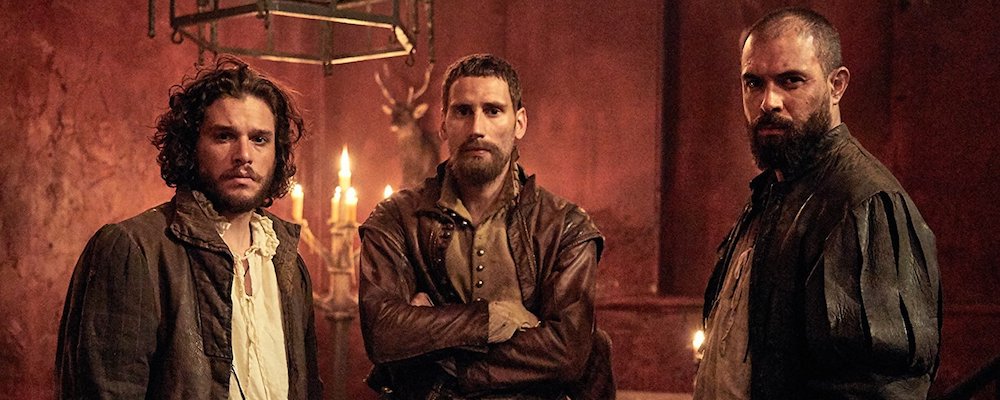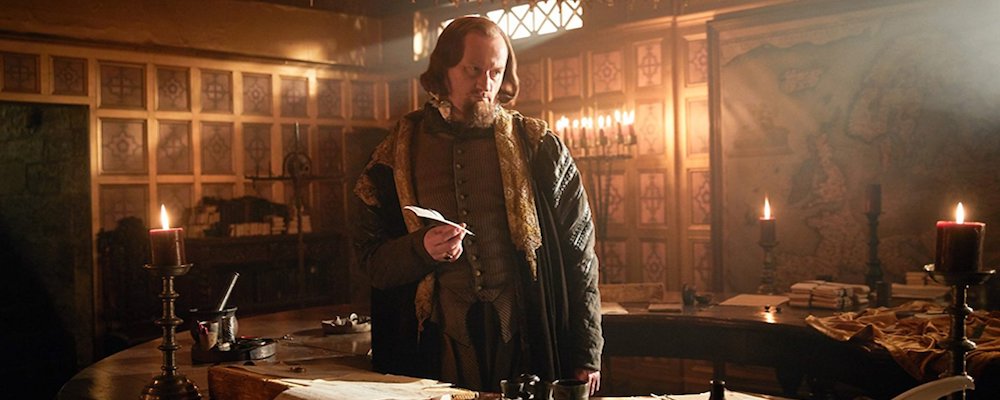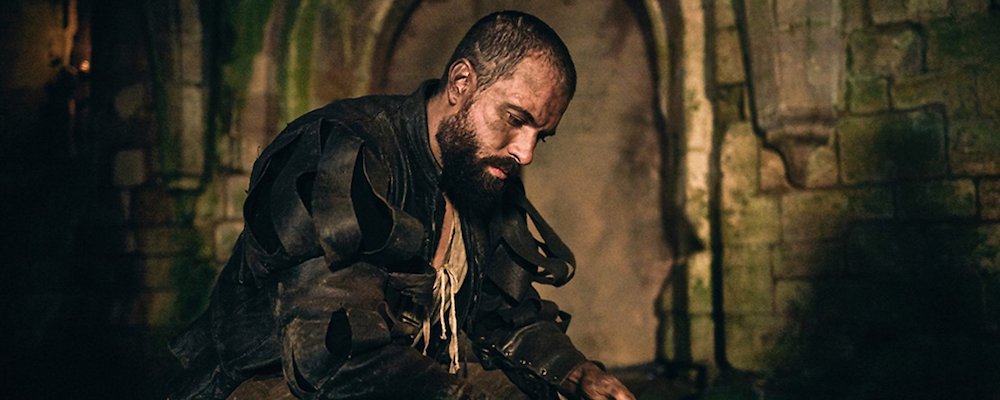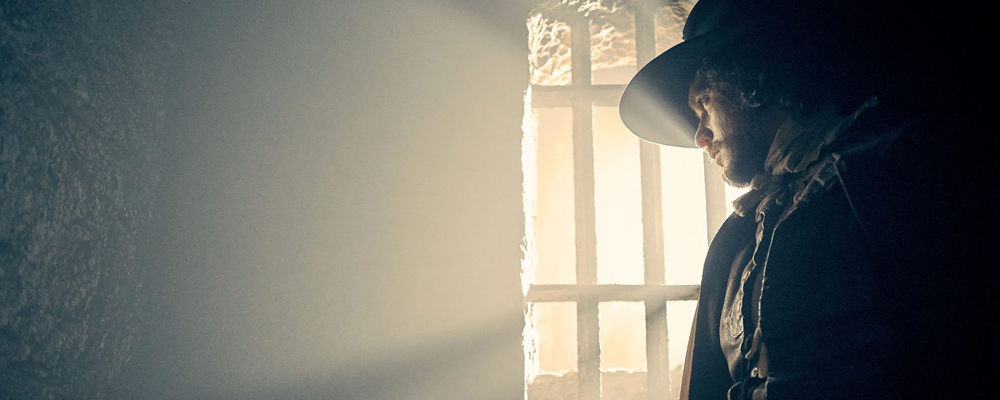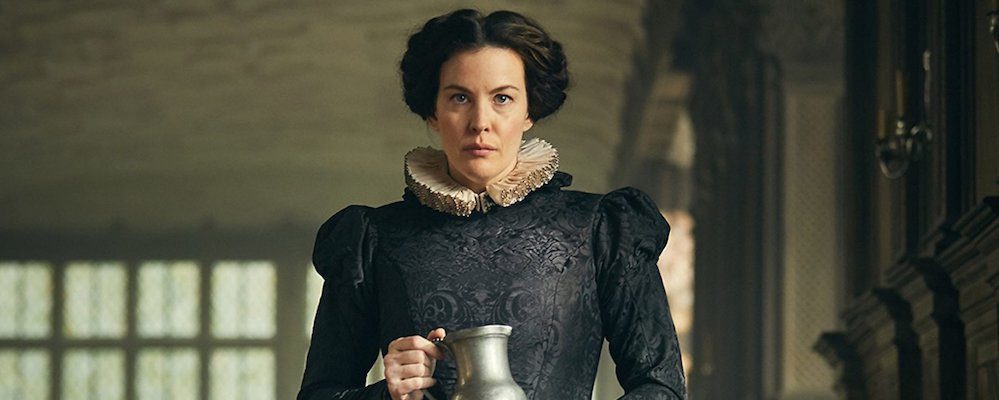‘Gunpowder’ Stars Mark Gatiss and Tom Cullen Take Us Inside the Myths of Guy Fawkes
Tony Sokol
Kit Harington, who plays the King of the North on the historical allegory fantasy series “Game of Thrones,” goes up against a monarchy In HBO’s miniseries “Gunpowder.” Harington plays Robert Catesby, ringleader of the Monmouth Rebellion, a group of persecuted English Catholics who plotted to assassinate King James I (Derek Riddell) by blowing up the British Parliament’s House of Lords in London in 1605. Ronan Bennett’s drama, which also stars Liv Tyler as Anne Vaux, who may very well have saved Catholicism in England, is a frank and unblinking documentation of the Gunpowder Plot, presenting blame, brutality, and desperation equally.
The rebellion to be lit by Guy Fawkes (Tom Cullen) was put down by the king’s Machiavellian spymaster Robert Cecil, played by Mark Gatiss. Gatiss and Cullen let Entertainment Voice put the screws to their thumbs for an open discussion on a dark chapter in history that gave an iconic face to rebellion. Guy Fawkes is the godfather of violent civil disobedience. He is so associated with conspiratorial terror tactics, he has his own day in England.
“As a kid in the UK on the fifth of November we burn an effigy of Guy Fawkes,” Cullen told us. “It’s made of sawdust and hay and paper plates, whatever. I never really knew why we were burning him. I knew he’d tried to blow up the House of Parliament. But the weird thing is, his story kind of got bastardized in many ways. Not many people really know the truth of the story. People get confused about whether he was a hero or not, and whether they’re celebrating him by burning him, or if it’s a warning.”
While Robert Cecil might let his chief enforcer Sir William Wade (Shaun Dooley) coerce answers through a third degree, the actor who plays him testfied willingly. “In Britain we burn Guy Fawkes’ effigy every 5th November to commemorate the fact that this plot was foiled,” explained Gatiss, If you ask people about the story of the Gunpowder Plot, in fact we did ask some people, the details have become so blurred that some people think they actually blew up the houses of Parliament.”
Gatiss admits to a special affinity for this revolutionary but overlooked time period. “I love the Stewarts and they’re not ‘done’ that much, particularly the reign of Charles I and the English Revolution/Civil War and Cromwell. But this is where it all began, with the accession of James to the throne of England and Scotland and obviously the Gunpowder Plot is perhaps the most famous part of it. But there’s an awful lot of stuff there that’s very rarely examined. It’s a fascinating period, very rich and off the back of the Tudor dynasty it tends to be a little overshadowed.”
Director J. Blakeson went to great pains to show the historical horrors perpetrated by both the Protestant and the Catholic churches. In one scene, the rebels are forced to watch two Spanish Jews get burned at the stake by the Constable of Castile (Pedro Casablanc) before their request for aide is considered. Another shows crowds cheering as the elderly Lady Dorothy (Sian Webber) is stripped of her dignity and clothes, and crushed to death on the orders of the anointed thugs of the Church of England. When the series premiered on BBC, some reviewers felt the attempts to capture the reality of the times were a tad too painful.
“The violence has been criticized, yes, but I think if we had held back on it the same people would have accused us of soft soaping it,” Gatiss said. “It was a brutal time and I think people don’t really have an idea of what was going on then. One of the reasons I was interested in doing it was to get to the actual meat of this real story and how Catesby was the principal conspirator. Obviously Guy Fawkes is the most well-known element of it, but it was Catesby’s plot and deeply connected to the oppression the Catholics were facing. A huge part of that was the torture that went on. So I think it’s crucial to say that and, compared to “Game of Thrones,” it’s really nothing. I think the fact that it was on BBC One primetime and people aren’t used to seeing something that graphic. But compared to a lot of things it’s pretty mild.”
It wasn’t particularly mild to the man who almost got to light the fire in the storage chambers below London, who feels some history lessons are best learned in hard ways. “When I first saw it on the page I thought it was very bold, and watching it, I had to watch it through my hands,” Cullen admitted. “But the thing about the violence is it’s important to show the context of this world. It’s important to understand why these men might have done what they did. What might have driven them to contemplate this heinous act of blowing up the House of Parliament? It’s important to understand how brutal human beings can be, and how brutal we were and are.”
The soft-spoken Cullen, who screams a lot in “Gunpowder,” also went to great pains to bring out the fingernail-ripping cinéma vérité beauty of historical accuracy with scenes on the torture rack. “When I was being stretched, they were actually stretching me, at my request, in order to make it look reasonably authentic,” Cullen said. “Obviously, they weren’t tearing my limbs out, but I didn’t want to fake it. I wanted to have a certain level of pain. So it wasn’t that hard to imagine. There wasn’t anything I really drew on other than that.”
Regardless of how serious a staged work is, an actor’s job is to play. While the actors couldn’t mess about with the torture equipment, “the stuntmen wouldn’t have allowed that at all” Cullen admitted, swordplay is another matter entirely. “I’m a big fan of fight scenes I really, really love doing them. I’m a big sportsman, so that must be why I enjoy it so much. It’s difficult and, yeah, it has a lot of sport in it.”
Compared with many period pieces, the action scenes in “Gunpowder” come off as a dangerous game. “I’d just come from a job where I’d been fighting a lot,” Cullen said. “All fights are very complicated on that show, very complex. But on this, they were using real swords, and the stunt coordinator wanted us to fight, without any choreography. He wanted it to be authentic and for us to surprise each other. I think it adds an irreplaceable sense of fear, which you can’t really replicate. That’s what we did. We got a few whacks and a few bruises but it was really really good fun.”
The whacks and bruises pay off on the screen. The actors lose their cool and allow themselves to get disoriented. The players throw off any semblance of vanity in their roles. They don’t retain composure. They let themselves come across as uncomfortable and positively awkward. The sword fighting scenes in “Gunpowder” project a genuine jeopardy. Gatiss suffered more subtle on-the-job injuries while being fitted into a part that was historically too small for him.
“I’m awkward because Cecil was a hunchback and he was also about 4 foot 8 so I wasn’t really the right person to be cast,” Gatiss admitted. “But I wanted to at least suggest that there was something physically wrong with him so I gave myself this cricked neck which became genuinely painful and I wished I had never done it. But I think it was very good for the character because that’s what he was like. James called him his little beetle so I just had to take the edge off my height to suggest that awkwardness.”
The spymaster of the court of the king didn’t have help keeping him out of shape. He mustered the genetic British power of the stiff upper lip. “I didn’t have any prosthetics,” Gatiss said. “I would have liked something to rest my chin on but I just did it myself and then I actually got a referred pain in my back from doing it for so long.”
The actor playing the face of rebellion found his character’s history in his uniform. “It’s always a very fun moment when you put on the costume for the first time,” Cullen said. “It’s always a long process of trying to figure out who this person is and what he looks like. We actually went through a lot of permutations with him. One of the things I was really eager to distinguish about him was that he was different. He was brought in. He didn’t look like the rest of the guys. That’s why we decided to shave his head and put the scars in, and give him a sense of a battle-hardened man, somebody who even the plotters are scared of, uneasy with.”
The iconic rebel was a veteran and a victim of suppression. He served 10 years as a soldier fighting in the Spanish Netherlands to put down the Dutch Revolt. “He is in many ways the reality of their decision. He is a reflection of that, an extreme one. We had an amazing costume designer and the look and feel of what she went for was very fantastic. She gave it a sense of the dirt and the darkness of that period of time,” Cullen said.
In today’s colorful times, the internet activist group Anonymous uses the mask of Guy Fawkes from the film “V for Vendetta” as their logo. His latest masquerader doesn’t see this portrayal replacing those on costume racks next Halloween. “Oh, I hadn’t even been thinking of that,” Cullen laughed. “No, I think my face is as interesting as that mask.”
Cullen, who cites Che Guevara as “a hero of mine in some respects,” didn’t impose modern guerilla tactics on his acting prep. “I went purely from history, really, and from the script,” he said. “When you’re doing a historical piece, you owe it to the man you’re playing to get as much truth in it as possible. You try and imagine what this person may have looked and felt like. I don’t draw from any external influence or other performance. It’s about what’s on the page and what’s in the history books.”
For all his flaws, missed family commitments and general conniving nature, Gatiss found personal reasons to appreciate the espionage master he played. “I did like Robert Cecil,” Gatiss said. “I find him a fascinating character. It does depend on which side of the argument you’re on. After all, Cecil was a man doing his job, very ruthlessly, but his commitment was to the safety of the crown and the King and therefore The State. He’s not an evil man in the sense that any of them were. They were committed to their ideals on both sides as Catesby and Fawkes were. So it’s really all shades of grey.”
Entertainment Voice wondered if Parliamentary procedure changed much since the shadow group’s failed forced redecoration. “Well actually no,” Gatiss said. “Amazingly every November 5th they still search what they call the Guy Fawkes cellars. Obviously it’s just become a tradition to do so but actually if you were going to blow it up, as I attempted to do in ‘Sherlock,’ going underground is still the best way to do it so I think the search of the cellars is still a good idea.”
The man who plays Sherlock Holmes’ older and ostensibly smarter brother detects similarities between the deviously dutiful secretary of state and spymaster who foiled the Gunpowder Plot and the espionage master who almost set off the cellars himself on “Sherlock.” “There are obviously parallels between Cecil and Mycroft as there are between Mycroft and Peter Mandelson and Stephen Gardiner from Wolf Hall, all of whom I’ve played,” Gatiss said. “It’s the niche I have slipped into which is playing Machiavellian men behind the throne and pulling the puppet strings. I think it’s time I stopped because people are just offering me those kinds of parts.”
Though not explored in depth in “Gunpowder,” some historians label Robert Cecil, the man who whispered half-truths to power, a provocateur. “Possibly,” Gatiss said. “There’s a strong argument that he sort of knew all about the plot and let it incubate long enough in order to stage a very great coup de theatre and catch everyone red handed in a way that if he’d just sort of told the King there was a vague plot it wouldn’t have had the same dramatic effect. And it really did have a dramatic effect. We’ll never know from this distance, the extent to which his spy networks were across so many things. I’d be surprised if he didn’t know quite early on what was going on and decided it was the perfect time to spring his trap.”
“Gunpowder” makes the decision to leave historical ambiguity intact. Revolutionaries and counter-revolutionaries slide uneasily between labels of villains or heroes. “I think what the show’s done really well is it hasn’t really made a decision,” Cullen said. “It’s not a bit of propaganda. It’s a historical piece. It’s left up to the audience to decide. In no way are his actions defensible but you can empathize with why someone would try and do what he did.”
The miniseries inadvertently showcases how Guy Fawkes’ explosive political commentary still resonates today. “You don’t need to push the parallels,” Gatiss pointed out. “The extraordinary thing is a few years ago this would have very much felt like a ‘wasn’t it very strange back then’ sort of thing and an extraordinary plot to blow up Parliament. But then literally the day we were shooting the scene in which letter tipping off Lord Monteagle to go to Parliament is received was the day of the Westminster Bridge attack literally outside Parliament, a terrorist attack.
“I think it’s extremely relevant. Cecil is pleading with the King to be given more draconian powers and you hear that all the time from various governments nowadays: that to protect the security of the state we need to come down hard on these people, on these insurgents, whatever hue they are whatever political character, that these people are dangerous that they must be checked and we need powers to arrest them. Essentially the same as it ever was and in terms of the torture. I’m afraid to say that the world is devolved. There are places around the world, as I speak, where people are being tortured, crucified, beheaded, set on fire, all these things that we once confined to history are unfortunately back with a vengeance,” Gatiss concluded.
Kit Harington’s rebel leader appears to spur his gang of rebels to action through righteous rage rather than vendetta. The miniseries is just a reminder. “I think history proves itself difficult and human beings, unfortunately, have short memories,” Cullen said. “What we can draw today, and it’s not something that’s pushes a political agenda or anything like that, but I hope the thing people take from it is to learn that intolerance is, unfortunately, an important human trait, and is unhealthy. We live in a world of intolerance and fear, and we must learn to try not to. To try and change that, basically.”
We asked Gatiss to contemplate how history may have changed if the explosives hadn’t been discovered. “If the plot had succeeded and they’d put one of James’ daughters on the throne as a kind of Catholic puppet then everything would have changed,” he posited. “Genuinely, if it had succeeded the whole of the English establishment would have been wiped out in one stroke and who knows? It depends on how popular the revolt would have been and whether people would have risen up in support of it of if they’d risen up to defeat them. There’s no guarantee that if Parliament had gone up that the nation would have risen in support of Catesby and Catholic conspirators. They’d had Elizabeth on the throne for 45 years and England was pretty much settled officially as a protestant state, but who knows? We shall never know.”
The first part of “Gunpowder” premieres on HBO Monday, Dec. 18, at 10 p.m. ET, second and third installments premiere on Tuesday, Dec. 19, and Wednesday, Dec. 20, at 10 p.m. ET.

